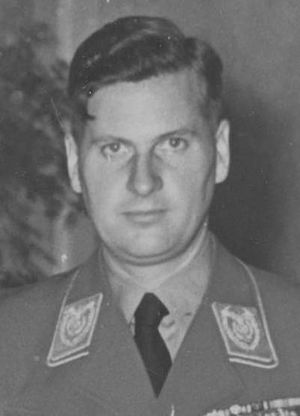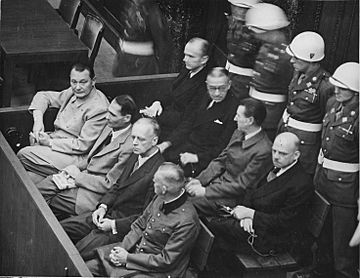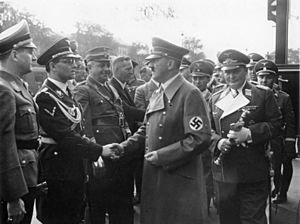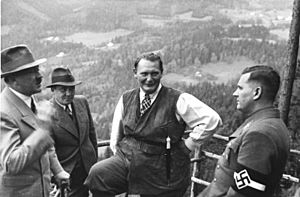Baldur von Schirach facts for kids
Baldur Benedikt von Schirach (born May 9, 1907 – died August 8, 1974) was a German politician. He is best known for being the national youth leader and head of the Hitler Youth from 1931 to 1940. Later, he became a regional governor, called Gauleiter and Reichsstatthalter, in Vienna. After World War II, he was found guilty of crimes against humanity during the Nuremberg trials and was sent to prison for 20 years.
Quick facts for kids
Baldur von Schirach
|
|
|---|---|

Schirach as Reichsstatthalter in 1942
|
|
| Reichsjugendführer | |
| In office 30 October 1931 – 8 August 1940 |
|
| Deputy | Karl Nabersberg Hartmann Lauterbacher Artur Axmann |
| Preceded by | Office established |
| Succeeded by | Artur Axmann |
| Reichsleiter for Youth Education | |
| In office 2 June 1933 – 8 May 1945 |
|
| Reichsstatthalter of Reichsgau Vienna | |
| In office 8 August 1940 – 8 May 1945 |
|
| Leader | Adolf Hitler |
| Preceded by | Josef Bürckel |
| Succeeded by | Office abolished |
| Gauleiter of Reichsgau Vienna | |
| In office 8 August 1940 – 8 May 1945 |
|
| Preceded by | Josef Bürckel |
| Succeeded by | Office abolished |
| Personal details | |
| Born |
Baldur Benedikt von Schirach
9 May 1907 Berlin, Brandenburg, Prussia, German Empire |
| Died | 8 August 1974 (aged 67) Kröv, Rhineland-Palatinate, West Germany |
| Political party | National Socialist German Workers' Party (NSDAP) |
| Spouse |
Henriette Hoffmann
(m. 1932) |
| Children | 4, including Richard von Schirach |
| Civilian awards | Hitler Youth Golden Honour Badge with Diamonds and Rubies Golden Party Badge |
| Signature | |
| Military service | |
| Allegiance | |
| Branch/service | German Army |
| Years of service | 1939–1940 |
| Rank | Leutnant |
| Unit | Infantry Regiment Großdeutschland |
| Battles/wars | Battle of France |
| Military awards | Iron Cross, 2nd class |
| Criminal conviction | |
| Criminal status | Deceased |
| Conviction(s) | Crimes against humanity |
| Trial | Nuremberg trials |
| Criminal penalty | 20 years imprisonment |
Contents
Early Life and Family
Baldur von Schirach was born in Berlin. He was the youngest of four children. His father, Carl Baily Norris von Schirach, was a theatre director. His mother, Emma Middleton Lynah Tillou, was American. Because of his mother, English was the first language he learned. He didn't learn German until he was five years old.
In 1932, Schirach married Henriette Hoffmann. Her father was Adolf Hitler's personal photographer. This marriage helped Schirach become part of Hitler's close group of friends. Baldur and Henriette had four children. Schirach was also a writer and supported the arts.
Rise in the Nazi Party
Joining the Youth Movement
Schirach joined a youth group at age seventeen. He became a member of the Nazi Party in 1925. In 1928, he became a leader in the National Socialist German Students' League. He was also a national speaker for the Party, helping with their propaganda.
Leading the Hitler Youth
In 1931, Schirach was named the National Youth Leader of the Nazi Party. He then became the Reichsführer (National Leader) of the Hitler Youth organization in 1932. This group was for young people in Germany. He also became a member of the German parliament, the Reichstag.
After the Nazis came to power, Schirach was made Reichsleiter (Reich Leader) for Youth Education. This was a very high rank in the Nazi Party. He was also made the Youth Leader of the German Reich. This meant he was in charge of all youth organizations in the country.
Schirach often appeared at large rallies, like the Nuremberg rally in 1934. He was seen with Hitler, encouraging the Hitler Youth members. He made the youth organization very military-like. Members practiced military exercises and used equipment like rifles.
In 1939, Schirach joined the army. He served during the Battle of France as a dispatch runner. He was promoted and received an award for bravery, the Iron Cross, before being called back to Germany.
Governor of Vienna
In 1940, Schirach became the Gauleiter (regional leader) and Reichsstatthalter (Reich Governor) of Vienna. These were very powerful jobs. He stayed in these roles until the end of the war. He was also put in charge of organizing the evacuation of 2.5 million children from cities that were being bombed by the Allied forces.
Schirach was involved in the forced removal of many Jewish people from Vienna. During his time as governor, many Jewish people were sent away. In a speech in 1942, he tried to justify these actions. Later in the war, he spoke about treating people in Eastern Europe more fairly. He also criticized the conditions in which Jewish people were being sent away. Because of this, he lost favor with Hitler in 1943, but he remained in his position in Vienna.
As the war ended, Vienna was attacked by the Red Army. Schirach broadcast a final message, telling citizens to fight. He then left his headquarters. He surrendered to American forces in June 1945.
Trial and Imprisonment

Schirach was one of the main leaders put on trial at Nuremberg after the war. This was a trial held by the International Military Tribunal. During the trial, Schirach was one of the few defendants who spoke against Hitler.
He was found guilty on October 1, 1946, of crimes against humanity. This was because of his role in the forced removal of Jewish people from Vienna. He was sentenced to 20 years in Spandau Prison in Berlin.
In 1949, his wife Henriette divorced him while he was in prison.
Schirach was released from prison on September 30, 1966, after serving his full sentence. He then lived quietly in Southern Germany. He published his memoirs, Ich glaubte an Hitler ("I believed in Hitler"), in 1967. He also gave an interview where he talked about his time in prison and meeting Hitler. He said he didn't know about the worst actions, but he admitted his guilt regarding unfair laws. Baldur von Schirach died on August 8, 1974, at the age of 67.
Images for kids
See also
 In Spanish: Baldur von Schirach para niños
In Spanish: Baldur von Schirach para niños
- Glossary of Nazi Germany
- List of Nazi Party leaders and officials
- The Holocaust in Austria
 | Percy Lavon Julian |
 | Katherine Johnson |
 | George Washington Carver |
 | Annie Easley |



